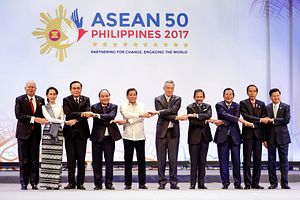The 30th ASEAN Summit just successfully concluded in Manila. Hosted by the Philippines’ President Rodrigo Duterte, the summit’s theme was “Partnering for Change, Engaging the World.” Yet while ASEAN has made some remarkable achievements over the last five decades, there remain some doubts on the future prospect of this regional organization and the region as a whole.
The Southeast Asia region is diversified in many ways. For one thing, it is marked by a fragmented state of democratic development, which could probably be explained by looking at the region’s different political values in regards to governance systems.
Since the 2007 ASEAN Charter, ASEAN has been pursuing political and democratic reforms, albeit at a slow pace, under the umbrella of the ASEAN Community. Some principles of the Charter, however, have not been adequately implemented and to some extent, are almost neglected by some ASEAN member states. That’s particularly true when it comes to issues concerning human rights, democracy, fundamental freedoms, good governance, and the rule of law.
Now, as the regional organization celebrates its 50th anniversary and its promise to bring about a rules-based, people-oriented, and people-centered ASEAN, there is increasing concern over the stagnant and, at times, regressive process of democratization in the region.
In the Philippines for example, the host country of the recent summit, Duterte’s controversial war on illegal drugs is a major part of a worrying assault on democracy values across the region. Doubts are growing over democracy in the Philippines due to Duterte’s approach. Human rights groups particularly have spoken out loudly about his “crimes” against humanity.
At the same time, Indonesia, the world’s third largest democracy, is currently being tested by the growing role of religion as a political tool. The Ahok incident, where the popular Chinese Christian governor of Jakarta lost his re-election bid due to blasphemy accusations, was taken by many as an indication of the uncertain future of the country’s secular democracy. In 2014, Jokowi’s presidential election victory was seen as a healthy sign for Indonesia’s democratic institutions; however, the growing influence of the Islamist groups could be a potentially destabilizing factor in Indonesia’s democracy.
In Malaysia, the growing suppression of dissent has reached an alarming rate in the midst of the country’s massive 1MDB corruption scandal, allegedly involving high-level politicians. With rumors that elections might be held this year, the sense of political uncertainty spells a gloomy outlook for Malaysia’s flawed democracy.
Meanwhile, the frequent military coups in Thailand have continued to destroy the democratic process in the country. The country’s newly promulgated constitution is expected to possibly lead to more political imbalance. And Myanmar started along a positive trajectory with a major victory by democracy leader Aung San Suu Kyi’s party marking the end of half-a-century of dominance by the military. But the celebration of democracy is tarnished when Suu Kyi is heavily criticized for not speaking out against discrimination and violence targeting Rohingya Muslims.
On the other hand, Timor-Leste’s application to ASEAN membership has been delayed for another round, despite being geographically located in Southeast Asia. According to Duterte’s full chairman’s statement, issued after the summit, “Timor-Leste’s application to become an ASEAN Member is still under study by the relevant senior officials.” He added, “To prepare Timor-Leste for membership in ASEAN, we reiterated our commitment to provide assistance to Timor-Leste for its capacity-building, in accordance with the elements and procedures agreed to by the ASEAN Coordinating Council Working Group (ACCWF) on Timor-Leste’s ASEAN Membership Application.”
As Southeast Asia’s youngest country, Timor-Leste’s bid for ASEAN membership remains a complicated case, particularly when the country scored the highest of any Southeast Asian state in the latest democracy index released by the Economist Intelligence Unit (EIU). There are constant questions about how would Timor-Leste’s democratic values would fit with the ASEAN framework, which is based on consensus and non-interference.
2017 is a particularly critical year for ASEAN and Southeast Asia to prove itself as a region that emphasizes putting ASEAN’s people first. At this juncture, the path to democracy is rocky for the Southeast Asia region. It is especially dangerous when the new generations emerging to take power in the region might not be instilled with democratic values, which could pose a challenge for their ability to accept or initiate democratic reforms.
Khoo Ying Hooi (PhD) is Senior Lecturer at the Department of International and Strategic Studies, Faculty of Arts and Social Sciences, University of Malaya.

































